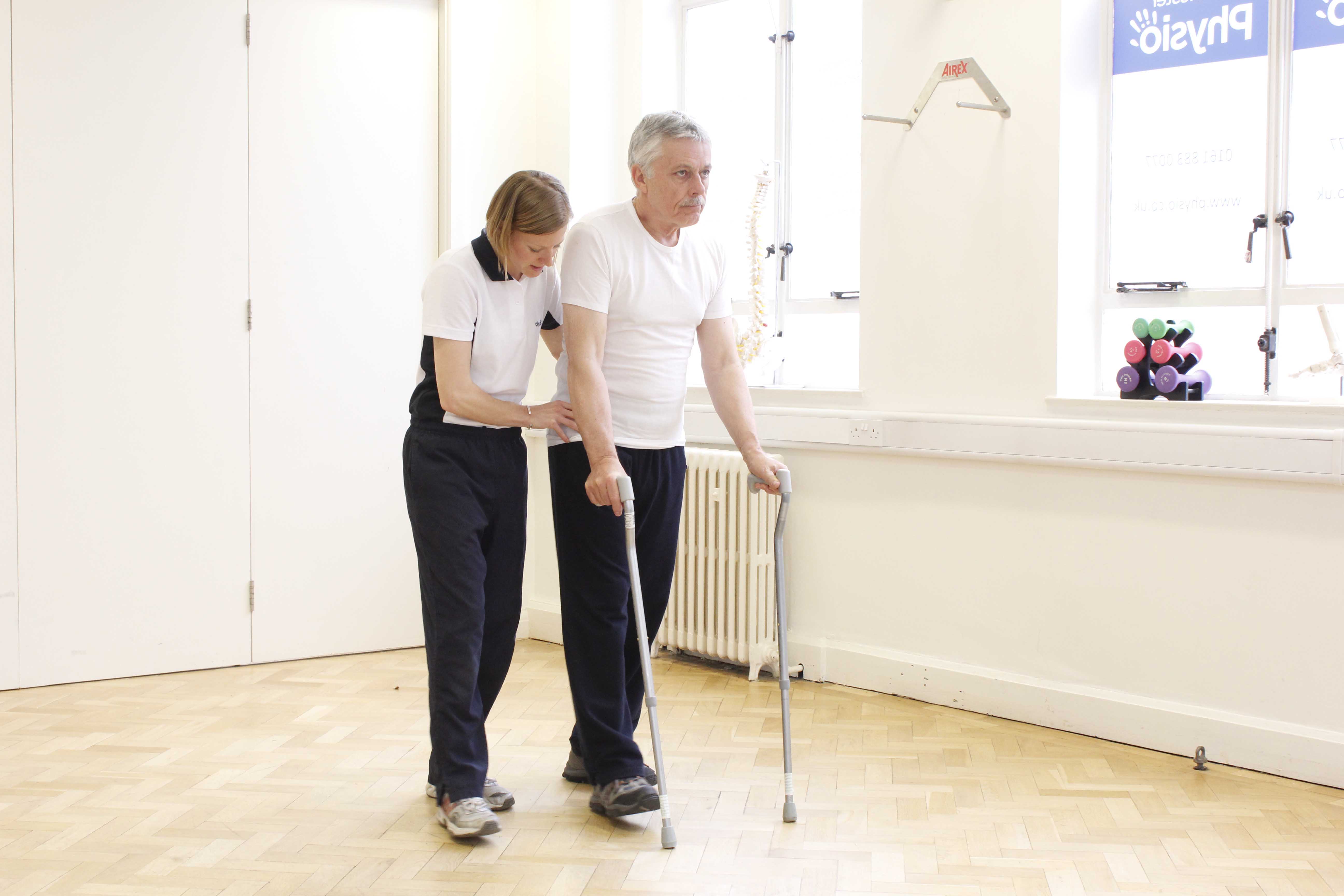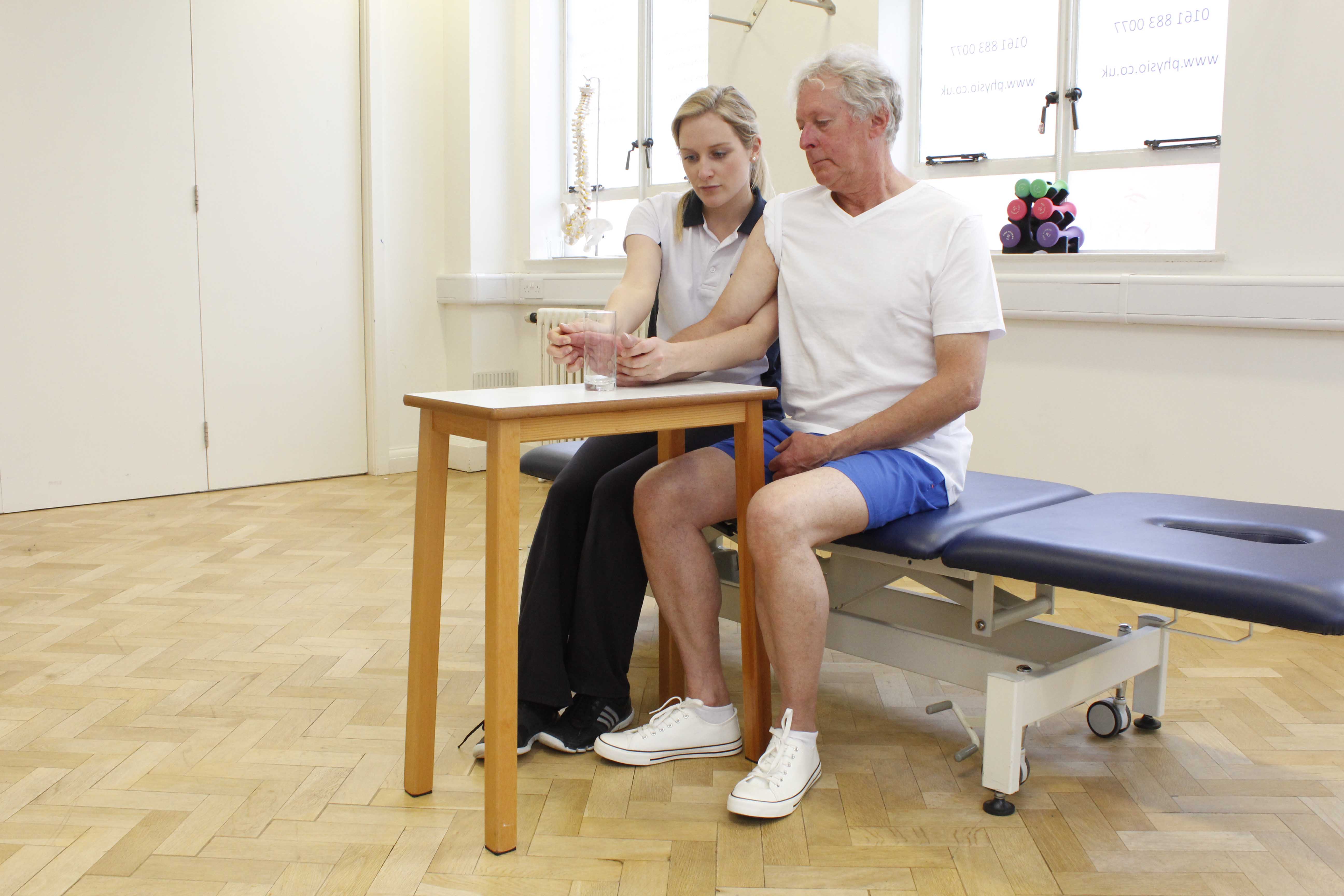What is multiple sclerosis?
Multiple sclerosis or MS is caused by damage to the nerve fibres in the central nervous system (brain and spinal cord) affecting movement, cognition and behaviour. MS is also termed an autoimmune disorder as the immune system attacks the myelin (protective sheath) that surround the nerve fibres disrupting signals travelling along these fibresresultingin a loss of muscle control, balance, coordination, difficulty walking and changes in mood.
Every person with MS has a unique presentation. Symptoms are wide ranging and variable. It affects more women than men and is caused by a combination of genetic and environmental factors.
Physiotherapy treatment will help with the symptoms of MS such as mobility, muscle spasm balance and coordination making life a great deal easier. Physiotherapy can promote recovery when relapses occur maximising potential and keeping a person with MS as active as much as possible for as long as possible.
 Above: Neurological physiotherapist supervising mobility exercises using a pair of walking sticks
Above: Neurological physiotherapist supervising mobility exercises using a pair of walking sticksTypes of multiple sclerosis
There are four main types of MSwhich include:
- Benign MS – this is the mildest form of MS and involves few relapses (times when your symptoms flare up). However, a person with this type of MS will need to have had very few or no symptoms for about 15 years before a diagnosis can be confirmed. This type of MS may get worse with age.
- Relapsing remitting MS – 80% of people with MS have this type of MS. This means you have relapses followed by periods of remission when your symptoms get better. Relapses occur when new or old symptoms flare up suddenly followed by a time of recovery or remission.
- Secondary progressive MS - About 50% who have relapsing-remitting MS go on to develop secondary progressive MS within 10 years. The symptoms do not get better once the relapse is over and slowly build up making everyday tasks more difficult over time.
- Primary progressive MS – this type of MS means that symptoms get steadily more severe without any periods of remission.
Diagnosis of multiple sclerosis
Symptoms can be very vague making diagnosis difficult. A person may have to undergo many tests to confirm a diagnosis and this can be a lengthy process. If MS is suspected you will be referred to a neurologist who will conduct a detailed neurological examination which may involve, magnetic reasonace imaging (MRI), evoked potentials or a lumbar puncture.
 Above: Neurological physiotherapist assisting with functional grip exercises
Above: Neurological physiotherapist assisting with functional grip exercisesWhat causes multiple sclerosis?
MS is caused by inflammation of nerve fibres in the brain and the spinal cord. This inflammation occurs because white blood cells start attacking the myelin covering the nerve fibres, which then develop scars called lesions, or plaques.
This slows down and can even stop the messages travelling along the nerve fibres. Over time, the myelin can be completely broken down and the nerve fibres themselves can become damaged.
It is not fully understood what causes this damage to the myelin. It has been suggested to have genetic and environmental components.
There is no single gene that causes MS, however, research into the possibility of a combination of genes that make MS more likely are under investigation.
Alternatively, people who are related to a person with MS are slightly more likely to develop MS.
MS is relatively common in the UK, North America and Scandinavia, but hardly ever occurs in countries such as Malaysia and Ecuador so research suggests that MS is more likely to occur in countries north of the equator suggesting climate influences. It has been suggested that MS could be triggered by a particular bacteria or virus which thrives in a cooler environments. However, more research is needed in this area.
What are the effects / symptoms of multiple sclerosis
The symptoms of MS vary from person to person as well as day to day.
The most common symptoms include:
Non Physical
- Eye problems, including pain, double vision, some blindness and difficulty focusing.
- Bladder and bowel problems
- Difficulty speaking and swallowing
- Mood swings
- Problems with learning and memory
- Sexual difficulties
- Fatigue
- Muscle weakness, stiffness and spasms (muscle contracting tightly and painfully)
- Loss of balance, coordination and dizziness making walking difficult
- Pain (neuropathic or musculoskeletal)
- Numbness or tingling of your skin
Physiotherapy for multiple sclerosis
Physiotherapy can be of great benefit to people with MS. It helps maintain independence by improving symptoms such as fatigue and muscle spasm, as well as preventing loss of mobility, strength and balance. Physiotherapists play a key role in the treatment of MS. Our specialised neurological physiotherapists at Physio.co.uk are experienced in treating people with MS.
Our dedicated physiotherapists at Physio.co.uk will help you achieve your maximum potential for physical independence, flexibility, strength and fitness levels, and provide advice and support on any new movement problems that may arise. Physiotherapy is important when the physical symptoms are changing, or during the recovery phase after a relapse. Physiotherapy aims to:
- Help control and co-ordinate movement patterns.
- Reducespasticity and encourage more normal movements.
- Regain functional abilities.
- Keep muscles strong and strengthen those that are weak.
- Keep joints mobile and prevent stiffness
- Improve co-ordination and balance.
- Prevent pressure sores.
- Prevent muscle contractures
- Reduce the risk of falling
- Promote recovery
- Correcting posture with particular emphasis on the right way to stand, to walk, to rise from a sitting or lying position, and how best to position oneself for sleeping.
- A range of exercises and physical activity to improve muscle strength and functional ability.
- Specialised stretches to relieve stiffness or spasms
- Exercises to build stamina and reduce fatigue
- Exercises to promote coordination and balance
- Advice on walking aids, ankle braces or orthotic devices to aid everyday activities and minimise injury.
- Hydrotherapy can help people with MS stretch tight muscles and improve posture in standing and walking.
- Promoting normal and easier movement so that you can enjoy a more active life.
Physiotherapy will also focus on activities of daily living and will maximise your potential and enhance your recovery.
Physiotherapy should commence as soon as possible following an initial attack to allow you to reach your full potential and limit the progression of your symptoms. The NHS physiotherapy services for MS often have a long waiting list and treatment is restricted to a few sessions. Our specialised neurological physiotherapists at Physio.co.uk are able to provide physiotherapy assessment and treatment as soon and as often as is required.
To book an appointment call 0330 088 7800, book online or alternatively request a free phone consultation.

 0330 088 7800
0330 088 7800

































